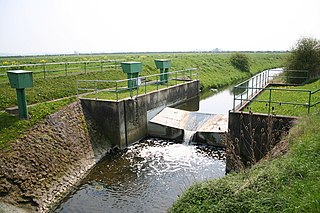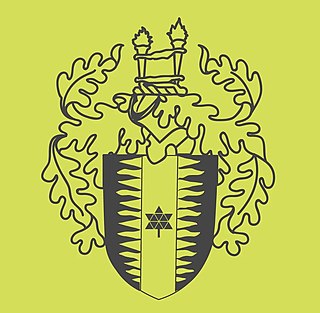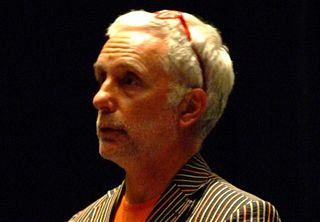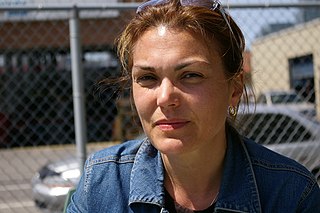
A stream gauge, streamgage or stream gauging station is a location used by hydrologists or environmental scientists to monitor and test terrestrial bodies of water. Hydrometric measurements of water level surface elevation ("stage") and/or volumetric discharge (flow) are generally taken and observations of biota and water quality may also be made. The locations of gauging stations are often found on topographical maps. Some gauging stations are highly automated and may include telemetry capability transmitted to a central data logging facility.
A journalism school is a school or department, usually part of an established university, where journalists are trained. 'J-School' is an increasingly used term for a journalism department at a school or college. Journalists in most parts of the world must first complete university-level training, which incorporates both technical skills such as research skills, interviewing technique and shorthand and academic studies in media theory, cultural studies and ethics.

Seneca College of Applied Arts and Technology, operating as Seneca Polytechnic. is a multiple-campus public college in the Greater Toronto Area, and Peterborough, Ontario, Canada regions. It offers full-time and part-time programs at the baccalaureate, diploma, certificate, and graduate levels.

Centennial College of Applied Arts and Technology is a diploma- and degree-granting college in Toronto, Ontario, Canada. It is the oldest publicly funded college in Ontario. Its campuses are situated on the east side of the city, particularly in Scarborough, with an aerospace centre at Downsview Park in North York.

Jay Ingram CM is a Canadian author, broadcaster and science communicator. He was host of the television show Daily Planet, which aired on Discovery Channel Canada, since the channel's inception in 1995. Ingram's last episode of Daily Planet aired on June 5, 2011. Ingram announced his retirement but stated he will make guest appearances on Daily Planet. He was succeeded by Dan Riskin. His book The End of Memory: A Natural History of Aging and Alzheimer's is forthcoming from St. Martin's Press in 2015.

The European Space Astronomy Centre (ESAC) near Madrid in Spain is the ESA's centre for space science. It hosts the science operation centres for all ESA astronomy and planetary missions together with their scientific archives. Past and present missions represented at ESAC include Akari, BepiColombo, Cassini–Huygens, Cluster, Exomars, Gaia, Herschel, Hubble, ISO, INTEGRAL, IUE, LISA Pathfinder, Mars Express, Planck, Rosetta, SOHO, Solar Orbiter, Venus Express, and XMM-Newton.
Journalistic ethics and standards comprise principles of ethics and good practice applicable to journalists. This subset of media ethics is known as journalism's professional "code of ethics" and the "canons of journalism". The basic codes and canons commonly appear in statements by professional journalism associations and individual print, broadcast, and online news organizations.

Science journalism conveys reporting about science to the public. The field typically involves interactions between scientists, journalists and the public.
The Science Media Centre is a charitable company, first formed in 2002, two years after the United Kingdom House of Lords Select committee on Science and Technology's third report on "Science and Society" in 2000.
SciDev.Net is a not-for-profit organisation that produces news, views and analysis about science and technology in the context of global development. It primarily engages with development professionals, policymakers, researchers, the media and the informed public.

Southern Maine Community College is a public community college in South Portland, Maine. It is part of the Maine Community College System.

St. Mary Catholic Central High School, known colloquially as SMCC, is a Catholic, co-educational, parochial, secondary school located at 108 West Elm Avenue in Monroe, Michigan. SMCC is sponsored by the Catholic parishes of the Vicariate of Monroe under the auspices of the Roman Catholic Archdiocese of Detroit. The school itself is listed as a contributing property within the St. Mary's Church Complex Historic District.
The Australian Science Media Centre (AusSMC) is an independent, not-for-profit service for the news media, giving journalists direct access to evidence-based science and expertise.
A press conference or news conference is a media event in which notable individuals or organizations invite journalists to hear them speak and ask questions. Press conferences are often held by politicians, corporations, non-governmental organizations, as well as organizers for newsworthy events.
The Submarine Command Course (SMCC), previously known as the Commanding Officers Qualifying Course (COQC), and informally known as The Perisher is a training course for naval officers preparing to take command of a submarine.
EvidenceNetwork.ca creates media content on public policy topics for publication in the mainstream media and links journalists with policy experts to provide access to non-partisan, evidence-based information. According to their annual reports, they have published hundreds of original articles in every major media outlet in Canada every year since 2011, reprinted over 3700 times across media outlets All of their content carries a Creative Commons license.

Regional Meteorological Centre, Chennai is one of the six regional meteorological centres (RMCs) of the India Meteorological Department (IMD) and is responsible for the weather-related activities of the southern Indian peninsula comprising the states of Andhra Pradesh, Telangana, Karnataka, Kerala, Tamil Nadu and the union territories of Andaman and Nicobar, Lakshadweep Islands and Puducherry. The other regional centres are located at Kolkata, Guwahati, Mumbai, Nagpur and New Delhi.

Penelope Dawn (Penny) Park was a Canadian journalist and science writer.

Véronique Morin is a Canadian science journalist who has worked for over 25 years to the dissemination and popularization of science.











